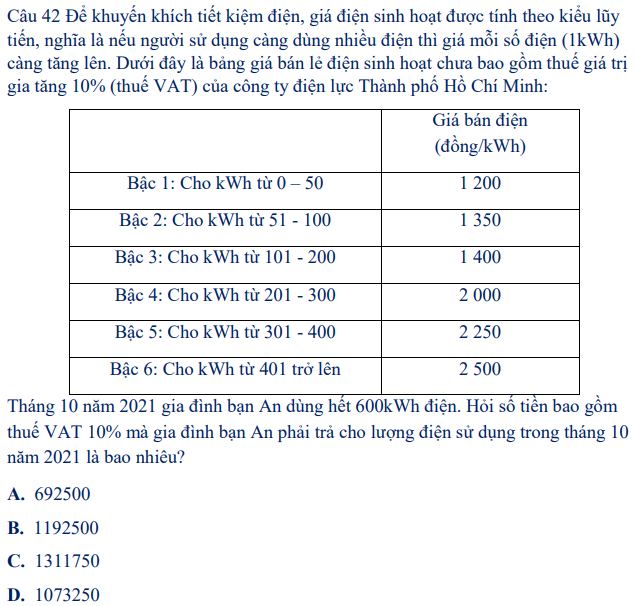
Hãy nhập câu hỏi của bạn vào đây, nếu là tài khoản VIP, bạn sẽ được ưu tiên trả lời.


x=4
=>x+1=5
A=(x+1)x^5 -(x+1)x^4+(x+1)x^3-(x+1)x^2+(x+1)x-1
=x^6+x^5-x^5-x^4+x^4+x^3-x^3-x^2+x^2-x+1
=x^6-x-1
=4^6-4-1
=4091
\(a,A=5\cdot4^5-5\cdot4^4+5\cdot4^3-5\cdot4^2+5\cdot4+1\\ A=4^4\left(20-5\right)+4^2\left(20-5\right)+\left(20-5\right)\\ A=15\left(4^4+4^2+1\right)=15\cdot273=4095\)
\(b,x=7\Leftrightarrow x+1=8\\ \Leftrightarrow B=x^{2006}-\left(x+1\right)x^{2005}+\left(x+1\right)x^{2004}-...+\left(x+1\right)x^2-\left(x+1\right)x-5\\ B=x^{2006}-x^{2006}-x^{2005}+x^{2005}+x^{2004}-...+x^3+x^2-x^2-x-5\\ B=-x-5=-12\)

1)Ta có:x=4=>x+1=5(1)
Mặt khác:A=x5-5x4+5x3-5x2+5x-1(2)
Thay (1) vào (2) ta có:
A=x5-(x+1)x4+(x+1)x3-(x+1)x2+(x+1)x-1
=>A=x5-x5-x4+x4+x3-x3-x2+x2+x-1
=>A=x-1=4-1=3
2)Vì a:5 dư 2,b:5 dư 3 nên:
Đặt:a=5x+2;b=5y+3
Khi đó:ab=(5x+2)(5y+3)=25xy+10y+15x+6
=5(5xy+2y+3x+1)+1
Vì 5(5xy+2y+3x+1)\(⋮\)5 nên =>5(5xy+2y+3x+1)+1:5 dư 1 hay ab:5 dư 1
Vậy ab:5 dư 1
3)
a)Nhận xét:
a1=1
a2=1+2=3
a3=1+2+3=6
a4=1+2+3+4=10
Khi đó:a100=1+2+3+...+100=\(\dfrac{100.101}{2}\)=5050
an=1+2+3+...+n=\(\dfrac{n\left(n+1\right)}{2}\)
b)Gọi 2 số hạng liên tiếp là n-1;n
=>an-1=1+2+3+...+(n-1)=\(\dfrac{\left(n-1\right)n}{2}\)
=>an=\(\dfrac{\left(n+1\right)n}{2}\)(ở câu a)
Khi đó:tổng 2 số hạng liên tiếp là an+an-1 là:
an+an-1=\(\dfrac{n\left(n+1\right)+n\left(n-1\right)}{2}\)=\(\dfrac{2n.n}{2}\)
=\(\dfrac{2n^2}{2}\)=n2 là số chính phương
Vậy tổng 2 số hạng liên tiếp là số chính phương

b: \(\dfrac{\left(x^2-1\right)\left(x^2+1\right)-2x\left(x^2-1\right)}{x^2-1}\)
\(=x^2-2x+1\)
\(=\left(x-1\right)^2\)
c: \(=\dfrac{5x^4-5x^3+14x^3-14x^2+12x^2-12x+8x-8}{x-1}\)
\(=5x^3+14x^2+12x+8\)

1: Sửa đề: 3x-5
\(=\dfrac{-x^2\left(3x-5\right)-3\left(3x-5\right)}{3x-5}=-x^2-3\)
2: \(=\dfrac{5x^4-5x^3+14x^3-14x^2+12x^2-12x+8x-8}{x-1}\)
=5x^2+14x^2+12x+8
3: \(=\dfrac{5x^3+10x^2+4x^2+8x+4x+8}{x+2}=5x^2+4x+4\)
4: \(=\dfrac{\left(x^2-1\right)\left(x^2+1\right)-2x\left(x^2-1\right)}{x^2-1}=x^2+1-2x\)
5: \(=\dfrac{x^2\left(5-3x\right)+3\left(5-3x\right)}{5-3x}=x^2+3\)

Bài 2:
a.
\(3x(x-4y)-\frac{12}{5}y(y-5x)=3x^2-12xy-\frac{12}{5}y^2+12xy\)
\(=3x^2-\frac{12}{5}y^2=3.4^2-\frac{12}{5}.(-5)^2=-12\)
b.
\(u=\frac{-1}{3}; v=\frac{-2}{3}\Rightarrow u+v+1=0\)
\(2u(1+u-v)-v(1-2u+v)=2u(1+u+v-2v)+v(1+u+v-3u)\)
\(=2u.(-2v)+v(-3u)=-4uv-3uv=-7uv=-7.\frac{-1}{3}.\frac{-2}{3}=\frac{-14}{9}\)
Bài 1:
\(A=x^6-(x^6-x^5)-(x^5+x^4)+(x^4-x^3)+(x^3+x^2)-(x^2+x)+1\)
\(=-x+1=-(x-1)=-(999-1)=-998\)

Bài 3:
Ta có: \(2n^2+n-7⋮n-2\)
\(\Leftrightarrow2n^2-4n+5n-10+3⋮n-2\)
\(\Leftrightarrow n-2\in\left\{1;-1;3;-3\right\}\)
hay \(n\in\left\{3;1;5;-1\right\}\)

x = 4
=> x + 1 = 5
Khi đó A = x5 - 5x4 + 5x3 - 5x2 + 5x - 1
= x5 - (x + 1)x4 + (x + 1)x3 - (x + 1)x2 + (x + 1)x - 1
= x5 - x5 - x4 + x4 + x3 - x3 - x2 + x2 + x - 1
= x - 1
= 4 - 1 = 3
Thay \(x=4\)vào biểu thức A ta có:
\(A=4^5-5.4^4+5.4^3-5.4^2+5.4-1\)
\(=1024-5.256+5.64-5.16+20-1\)
\(=1024-1280+320-80+20-1\)
\(=3\)
Vậy giá trị của biểu thức A khi x =4 là 3